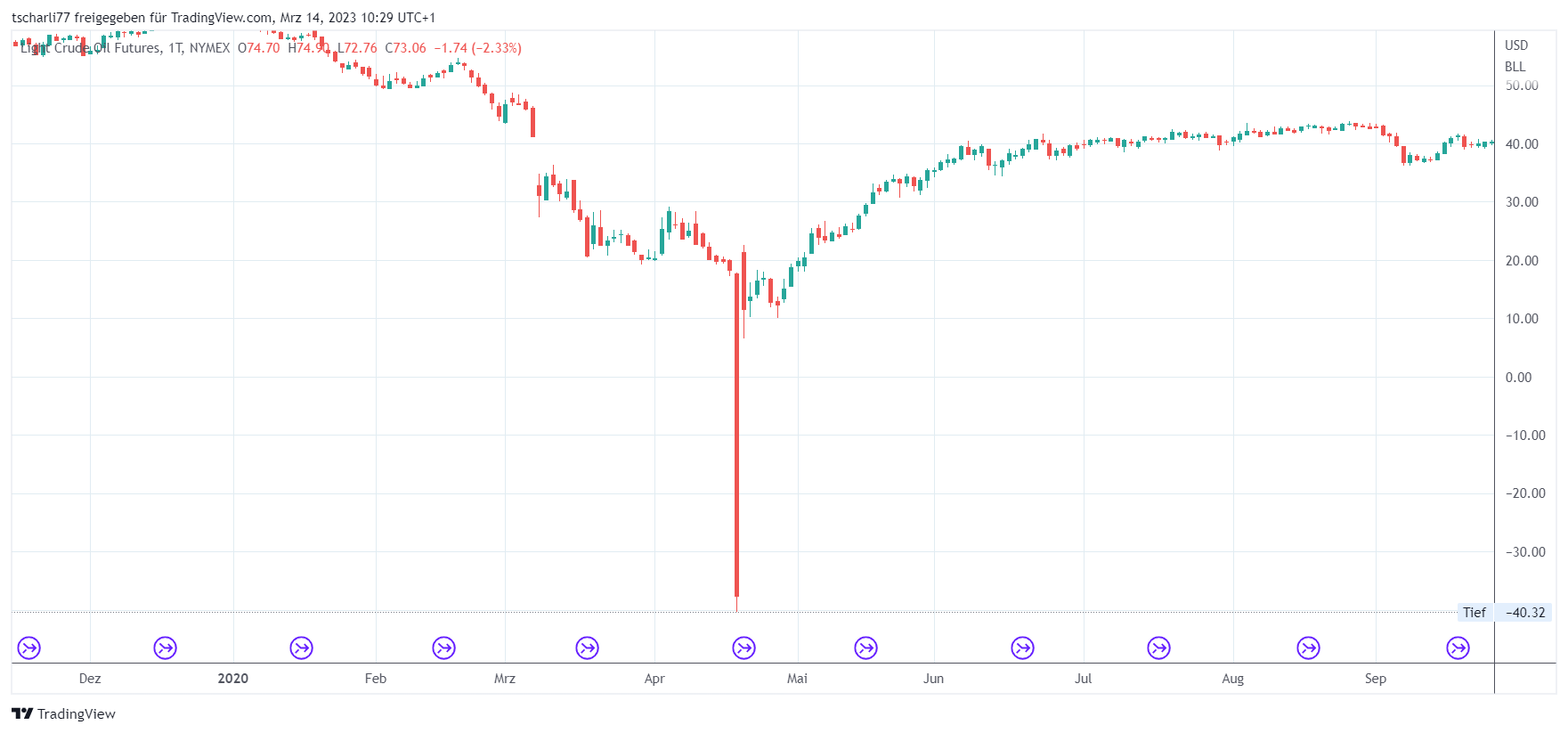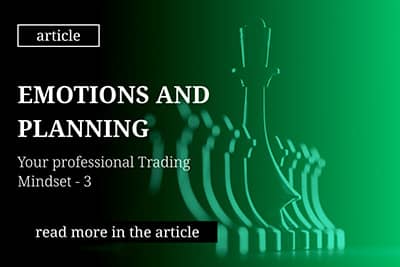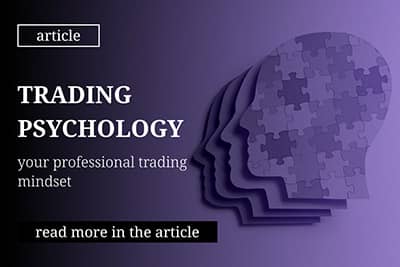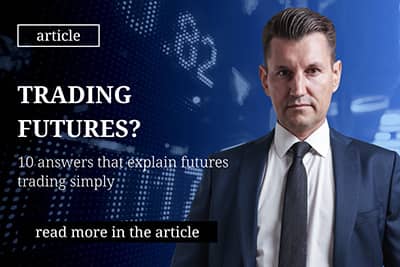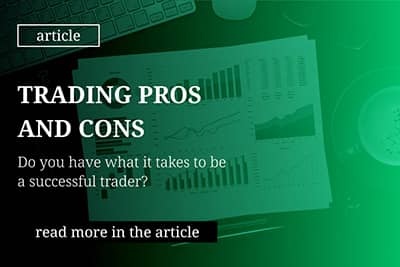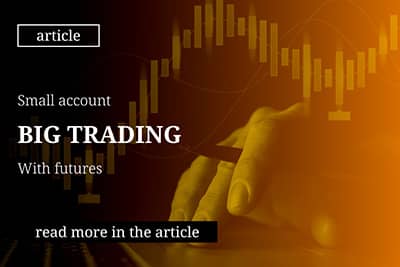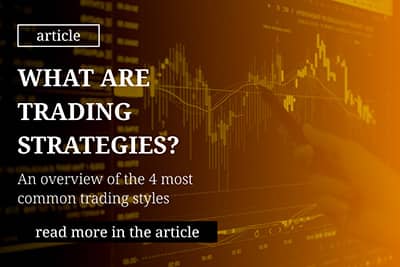Your professional Trading Mindset - 3.: Emotions and Planning
If you read books or articles on the Internet about trading psychology, you will always come across the following sentence:
Fear and greed are the two emotions that prevent the trader from winning.
This statement is absolutely correct! But - of course, here will stand a “BUT” - in my opinion there is more to it. One cannot narrow down the failure in trading so simply to these two central terms.
What else is behind it, what effects do these emotions have and above all: how can you get them under control?
That's what this article is about.
First of all a warning: I, or we, are not academically trained psychologists. What you read here are insights that we have gained from reliable literature sources AND my or our personal experience. It's like so often in life: what works for ME doesn't have to work for YOU. But some things are just SO FUNDAMENTAL that you can't and shouldn't shrug them off!
And now head on to the actual topic!
The emotional trader
Fear and greed are actually the most fundamental emotions that determine all our actions, not only in trading, but also in "Real Life".
Let's take a look at a few situations first:
- Trader Anny is speculating long in the market. The price is going up, fast and constant. She gets nervous, she has a feeling it's going too smoothly. The price could now make a sharp drop and Anny loses everything she has gained so far. She closes the position.
The price continues moving upwards. - Trader Bert is also in the market long. After initial gains, the price turns and runs into deficit. It continues to decline. Bert is waiting for the price to come back. It MUST come back! Bert stays in position. The broker's margin call comes in....
- Trader Charly had to take a heavy loss. Although it looked so good at the beginning. But then the market has conspired against him and almost halved his account. But now it's on. He will make up for the loss.
- Trader Dora has now suffered several bitter losses. She has become totally insecure. Everything seems to go wrong. She surrenders.
- It's different with Ernie: He's on a roll - his last trades have almost doubled his account. Here we go, nothing can stop him now. He flips through brochures. "This Corvette will soon be mine. One more real trade, then..."
Fear, greed and what else?
Fear and greed are considered the mortal enemies of the trader. But I think that greed is actually a special form of fear. The fear of falling short, of missing out on something. FOMO, a term that has even become part of our language. The "Fear Of Missing Out".
The one who greedily grabs every opportunity that comes his way - he wants it all, and he wants it now! He is basically afraid of not getting enough, of not being in front, of losing importance, of sinking into the masses. And to become impoverished.
Often, greed goes hand in hand with a character trait that is equally detrimental to success: selfish overconfidence. More about that in a moment.
How else does fear express itself in the trader. And what can he do?
- Example 1 shows the fear of being forced to give back money that has already been earned. This can also be explained subliminally by greed ("this is MINE, I'm not giving it away anymore"). How can one protect oneself in this case?
The simplest way is to adjust the stop. There are several possibilities here, e.g. on the basis of considerations of market technique, which will not be further explained here. - In the fourth example I show a bad consequence of fear: the trader surrenders. Several losses in a row, which may have permanently damaged the account, paralyze his judgment.
Instead of taking a break now and soberly analyzing how the losses occurred, he loses himself in self-doubt and resignation. This should not be the case if he acted correctly according to plan.
If his plan " previously worked ", he must analyze whether he deviated from it during the losing trades or whether certain market situations arose which he insufficiently took into account in his considerations.
In any case, a thorough analysis should provide information about WHAT went wrong and show him ways HOW to avoid this situation in the future.
Giving up is not an option!
Always be aware of the fact that losses are part of the game. We talked about this in the previous article (The Trader Fighting the Market). If you accept this fact, you can plan for your losses. If they do occur, they won't throw you off track, and if they don't - so all the better.
Hope
When considering the trader's emotions, one should not ignore another one that often goes hand in hand with fear: Hope!
Hope is good. Hope often gives us new strength, allows us to get through difficult times and look into the future with confidence. But hope can have the same effects in trading as fear, greed or overestimation: it prevents you from sober-rational thinking and consistent action.
As indicated in example 2 from above: quite a few traders have already had to realize that hope is often deceptive. Some hopes then dissolved in the worst case together with the trading account.
However, this must not mean to give up hope completely - by no means!
Hope and optimism are inseparable. The opposite of optimism is pessimism. And which trader is more successful, the Optimist or the Pessimist?
Robert Koppel writes in his book INVESTING and the IRRATIONAL MIND ① , that a sense of optimism is essential to implementing effective trading strategies.
Optimism, based on a competent understanding of the market and an appropriate approach, consolidates a positive feeling about one's abilities, the conviction and reliability of the trading method, and the existing opportunities in the market that reward the trader for making good decisions.
Optimism stems from the knowledge of being optimally prepared, applying a profound strategy and relying on robust risk management - all of which we are talking about today.
So when I talk about seeing hope as a negative emotion in trading, I am talking about "false hope", hope that is NOT based on solid trade management and strategic planning. I am referring to the hope of seeing the market and the current trade through rose-colored glasses and reciting the "everything will be fine..." mantra.
The market has no ears - it doesn't hear your OMMM!
FOMO - Fear Of Missing Out
But this second example illustrates another widespread bad habit of unsuccessful traders: the inability to get out of a position because "otherwise you might miss something!"
The logic makes perfect sense: if I'm out of the market, how would I catch the next move?
Yet the fact that the current loss is the real reason to get out of the position hardly plays a role in the equation.
Another and equally damaging behavior in the markets also results from the Fear of missing out: overtrading.
As is to be expected in Example 3: the trader wants (or MUST, as he thinks) to make up a loss. So he will enter every trade imaginable, " at any cost!"
He sees a move to the upside? With one click, he's market long. He doesn't bother - he doesn't have the time, otherwise the opportunity is lost - to analyze the situation, to plan the trade. And he will probably curse the market if it suddenly slides a little more into the void...
Greed in its purest form: I AM the KING Of The MARKET!
One form of greed seems to have nothing to do with fear: the "ALL MINE!" mindset. The trader who thinks he is infallible ( this one really exists, believe me!) and thinks he has to prove it to everyone what a top performer he is. His (often feigned) self-confidence has nothing to do with self-confidence. It is mostly a facade that crumbles away very quickly when things don't go according to plan.
The intelligent investor
But how do we make the step - which, in some cases, is more of a long jump - from emotional trader to intelligent investor?
Basically, trading on the stock market is about something that is not too difficult to understand: we buy a stock, a commodity or a future at a low price and wait until this price has risen in order to sell again at a profit. In the case of a short position, of course, the scales are reversed.
In doing so, we take care to keep potential (and unavoidable, as I mentioned before!) losses as small as possible and generate profits as large as possible.
Let profits run, limit losses!
Nothing more! Sounds simple, but it is not.
It requires two things from you:
- a comprehensive understanding of the commodity, the contract or the stock being traded, and
- a plan with a clearly defined risk and outcome orientation that prevents a single loss from getting out of hand.
This protects you from impulsive trades that destroy your trading account, and it allows you to make the right decisions even in tricky situations - namely, the decisions that are in line with your plan.
Plan your Trade, Trade your Plan!Another clever saying, but what does it mean? Nothing else than
- Look at the field, the opponent and the rules of the game before you kick off,
- and follow these rules during the game so you don't get sent off.
Looking at the "big picture"
The guiding principle of your actions must be the goal of long-term growth and financial stability. This excludes short-term thinking (and acting).
Develop a system of rules that fits your personality. Important here are the words to YOUR personality. It is of little use to fish for strategies of "successful" traders on the Internet and copy them 1:1.
Of course, these strategies can be successful, but just for THOSE traders who have developed them. Whether they are suitable for you, can not be guaranteed.
Establish your own rules. When will you trade, what markets and products. Set rules for your market entry (entry patterns) and more importantly for your exit. Set price markers that limit your maximum loss and those at which you close the position in case of profit. When do you want to realize partial profits, when do you want to tighten stops.
Of course, all this requires an intensive study of the market. How do prices behave seasonally, in which daily ranges does the price move and so on?
But it is even more important to stick to these rules. Impulsive trading can lead to success sometimes (the web is full of such stories). But traders who are successful in the long run do not trade impulsively, but systematically and consistently.
Work with your attitude
Even if I repeat myself here: all your strategy, all your planning, all your goal setting is worthless if YOU don't play along.
What is the use of an entry pattern that has proven highly reliable in the past if you lack the patience to wait for it to form?
- How often have you "jumped on a bandwagon", i.e. entered a well-advanced trend as quickly as possible, in order to " have been there"? And how often has that led to the desired bonanza?
What good is your risk planning and stop setting if you take the stop out of the market at the crucial moment because it is in danger of being released?
- How many times have you cursed being stopped out? With the thoughts "If only I had had a little more capital available...". In these cases, please check this out:: Would you really have made a profit with a greater risk (= more distant stop) - or just a greater loss?
What is the use of the most sophisticated strategy, if two or three losses throw you off track. Frustrating you or putting you into defiance and anger mode. And anger has never been a good advisor.
- When was the last time you struggled with the market, debated, yelled at the chart, or realized that "EVERYONE" is against you again?
Develop mental resilience
Resilience is a person's ability to cope with stress and crises. Losses don't throw him off course, gains don't make him "snap". He gets back on his feet after a disruption and stays grounded despite flights of fancy.
Building resilience means developing behaviors, thoughts, and actions that can help you survive adverse and extraordinary circumstances.
Specifically, it means developing the following psychological skills:
- Making realistic plans and taking the necessary steps to implement them consistently and consistently.
- Adopting a positive attitude toward yourself. Mistakes are there to be made. And once they are made, there is no point in sinking into self-pity and victimhood. Find a way out.
- Trust in your strengths and abilities.
- Solve problems instead of wishful thinking.
- Recognizing and dealing with your feelings and impulses.
I have included a checklist from the American Psychological Association (APA). It can help you develop personal strategies to build your resilience by focusing on past experiences and sources of your personal strength.
You can download it ► HERE.
How does the emotional actor differ from the intelligent one on the market?
| Reaction | smart winner | emotional loser |
| Patience | Waits for opportunities based on a well thought out plan | Hardly planning: reacts according to whim, (irrational) inclination, fallacy or illusion |
|---|---|---|
| Discipline | Sees the big picture, reacts thoughtfully | Emotional, anxious, often confused, does not know how to react. |
| Strategy | highly sophisticated, limit losses, exploit gains | Little planning, inconsistency |
| Expertise | Well prepared, does research | Unprepared, little market knowledge |
| Motif | Long-term motives that correspond to one's own personality | No clear motives, wants quick reward |
| Targets | Clearly defined | if at all, then unclearly defined |
| Risk management | controlled risk | none, impulsive reaction |
| Mindset | Resourceful, Confident, Aware | Anxious, disturbed |
In the next post we will talk about some psychological and mental reality distortions.
See you then!
Recommended reading:
① Robert Koppel: “INVESTING and the IRRATIONAL MIND, Rethink Risk, Outwit Optimism, and Seize Opportunities Others Miss”; McGraw-Hill Education Ltd (March2011)
Curious to learn more?
Get your hands on Max Schulz’s book by downloading it today! Free of charge.


